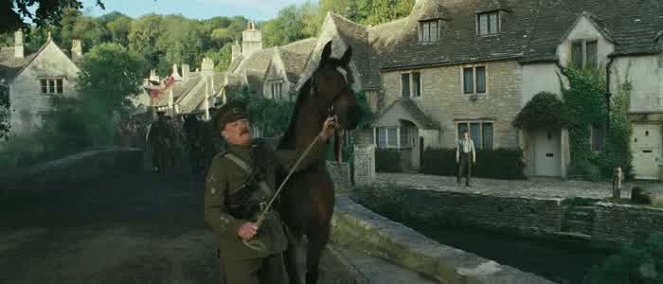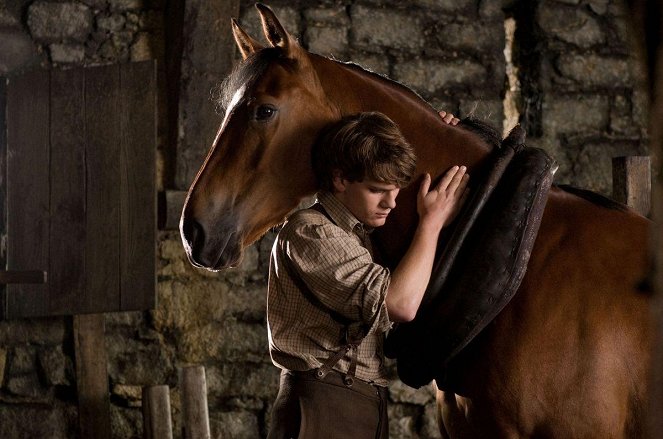Directed by:
Steven SpielbergCinematography:
Janusz KaminskiComposer:
John WilliamsCast:
Jeremy Irvine, David Thewlis, Emily Watson, Tom Hiddleston, David Kross, Benedict Cumberbatch, Peter Mullan, Niels Arestrup, Patrick Kennedy, Nicolas Bro (more)VOD (1)
Plots(1)
From legendary director Steven Spielberg comes the epic adventure War Horse, a tale of incredible loyalty, hope and tenacity. Based on the Tony award-winning Broadway play, and set against the sweeping canvas of World War I, this deeply heartfelt story begins with the remarkable friendship between a horse named Joey and his young trainer Albert (Jeremy Irvine). When they’re forced apart by war, we follow Joey’s extraordinary journey as he changes and inspires the lives of everyone he meets. (Walt Disney Studios Motion Pictures)
(more)Videos (54)
Reviews (12)
The depiction of an animal’s suffering at the hands of a person marks War Horse as a cousin of Bresson’s Balthazar, while the relay narrative structure is reminiscent of Jancsó’s The Red and the White. I realise that these are wild comparisons that I should tone down in time, but I still consider Spielberg’s latest film to be not only a return to the narrative tradition of the classic Hollywood of Victor Fleming and John Ford (references to westerns can be seen in the development of the theme of tradition vs. modernity and the cavalry charge against the German camp, reminiscent of Indian attacks), but (paradoxically) also a remarkable narrative experiment. The plot seems simple at first and I imagined the ease with which the screenwriter “sold” it to the producer (there’s a horse, there’s a boy, there’s a war), but opening the gate dividing the small world of family conflicts from the big world of war gives the story an unexpected boost. The supposed protagonist is sidelined and the film atypically takes on the horse’s point of view, for which we are gently prepared in advance by the emphasis placed on the other animals. The father-son drama in the background of the class conflict transforms into a patriotic drama, which later turns into a war story about friendship, and there is even a comedic episode to lighten the mood. All of the outwardly stylistically incongruous events are linked by the two words contained in the title: war and horse. However, the film doesn’t show war with the hyperrealism of Saving Private Ryan, but rather presents to us an admittedly distorted, almost childishly naïve version of war (the kitschy image of the sky like that seen in old Technicolor melodramas). We are given advance warning of death through meaningful shots and Spielberg softens the painful scenes (the execution) with masterful visual and sound shortcuts (though these are somewhat obvious in his directing), and the battle scenes are filmed predominantly in long shots rather than in close-ups, which would have revealed more. The idea of war is not subjected to direct criticism (as perhaps in no other American film) but is rather shown as an inevitability. The bloody global conflict serves to push the touching narrative to humanistic extremes (rescuing the horse would have resulted in two absurd sketches). Spielberg openly uses the inhumanity of war to reveal the humanity of the heroes. War Horse basically says, “life is a struggle, but you will win it”. That may seem ridiculous today, when even a lot of Hollywood films slowly vacillate and doubt, but Spielberg is still able to present it with a certain magnificence that in the delayed conclusion will give you a feeling of being victorious (as usual, it will take a while to re-establish your equilibrium after the preceding shocks). If you let it. 75%
()
This is going against the flow a little, but my problem with Warhorse isn’t that it’s a “chintzy Hollywood Spielbergesque tearjerker", but that in the end it isn’t like that at all. But that’s what it’s trying to be; too much, in fact; it is made like that but in its core it lacks the foundation to all movies like this - emotions. The bond between Albert and Joey is so slap-dash; it is ground up into mini-stories that blend into one; in the end I didn’t give a damn about either of them or about the movie either. And the movie should either have been much shorter (and just about those two) or should have been a regular mini-series, where each episode could tell one of the ten-minute escapades we see here.
()
A nostalgic look back to the heartiest, most melodramatic stage of cinematography. Film poetry for people who remember those times, maybe the last of its kind. Had it been twenty minutes shorter, it would have been one of Steven Spielberg’s best movies. That it’s one of his most personal films can be felt from every scene.
()
Steven Spielberg in the saddle! Still. And this time, literally. He holds the reins tight and... All right, I'll drop the horse analogies. Unfortunately, with War Horse, it's as I thought it would be. Many viewers were probably expecting a war battle sequence with non-stop action, a camera dirty with mud and blood, piles of dead... And they didn't know that Spielberg was adapting a book for slightly older children. So this is absolutely (in the best sense of the word) an ideal substance for him. He brought it to the screen with everything he had, and if the film deviates from Morpurgo's text, it's only for the best (the book, for example, is written in the first person and narrated by a horse, which also means that we don't see any battle scenes like the incredibly gripping trench battle Albert experiences in the film). That the Dartmoor scenes are pastel and kitsch to the point of shame? Yet their contrast with the war scenes stands out all the more. That Albert and Joey's intimate relationship makes anyone laugh? Haven't you ever had an animal and talked to them for hours? Isn't what many people call "zoophilia light" called friendship? And that's what War Horse is all about. It's an ode to friendship. The friendship of people with people, people with horses and horses with horses. When one sees how soldiers in different uniforms take care of horses with exactly the same love, one cannot even mind that the English, Germans and French do not speak their own languages, but English to a man... After all, they are all the same people, pitted against each other by a few powerful bastards who one morning wanted to start a war. There are a number of powerful and memorable scenes in the film (both the "light-hearted" ones, such as the ploughing or the car race, and the "warlike" ones, especially the cavalry charge, the windmill and the top sequence with the horse running through the raging "no-man's land" and culminating in the cutting of the wires) and I had no choice but to watch them contentedly, listen to the divine John Williams as I like him best, be moved now and then and clap my hands in spirit. I didn't know the runtime beforehand, but I honestly wouldn't have guessed that the whole adventure lasted 150 minutes. It passed so quickly and was so beautifully warm in the end.
()
A film about love, goodness and horses, in which the Great War also looks many times more pathetic and moralistic than in all of the anti-war pamphlets of the 1920s and 1930s. Paradoxically, this is not a problem at all - the main drawback of this captivating spectacle is Spielberg's absolute fondness for the surface. Everything inner and psychological disappears from the shots - everything is taken over by a rich visual arrangement. People and horses are explicitly props in the creator's professorial exhibition. Moments of emotion always and again come across the same thing - it's not the human (horse) story that impresses us, it's rather the respectable audiovisual construction, under which (unlike Steven's famous films) there is nothing at all, just a genre vacuum. This is simply not enough for a fairy tale, which War Horse is more than anything else.
()



Ads